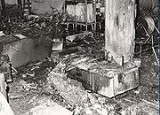
, influenced by:
- Sociological developments, pressure within the educational system in and outside Europe and the U.S. together with the background of counter-cultural movements.
- The writings of Mao ZedongMao ZedongMao Zedong, also transliterated as Mao Tse-tung , and commonly referred to as Chairman Mao , was a Chinese Communist revolutionary, guerrilla warfare strategist, Marxist political philosopher, and leader of the Chinese Revolution...
adapted to Western European conditions. - Post-war writings on class society and empire as well as contemporary Marxist critiques from many revolutionaries such as Franz Fanon, Ho Chi MinhHo Chi MinhHồ Chí Minh , born Nguyễn Sinh Cung and also known as Nguyễn Ái Quốc, was a Vietnamese Marxist-Leninist revolutionary leader who was prime minister and president of the Democratic Republic of Vietnam...
and Che GuevaraChe GuevaraErnesto "Che" Guevara , commonly known as el Che or simply Che, was an Argentine Marxist revolutionary, physician, author, intellectual, guerrilla leader, diplomat and military theorist...
as well as early AutonomismAutonomismAutonomism refers to a set of left-wing political and social movements and theories close to the socialist movement. As an identifiable theoretical system it first emerged in Italy in the 1960s from workerist communism...
. - Philosophers associated with the Frankfurt schoolFrankfurt SchoolThe Frankfurt School refers to a school of neo-Marxist interdisciplinary social theory, particularly associated with the Institute for Social Research at the University of Frankfurt am Main...
(Jürgen HabermasJürgen HabermasJürgen Habermas is a German sociologist and philosopher in the tradition of critical theory and pragmatism. He is perhaps best known for his theory on the concepts of 'communicative rationality' and the 'public sphere'...
, Herbert MarcuseHerbert MarcuseHerbert Marcuse was a German Jewish philosopher, sociologist and political theorist, associated with the Frankfurt School of critical theory...
, and Oskar NegtOskar NegtOskar Negt is a philosopher and social theorist in the tradition of critical theory. He is Professor of Sociology at the Universität Hannover....
in particular) and associated Marxian philosophers.
RAF founder Ulrike Meinhof
had a long history in the Communist Party.
1970 The Red Army Faction is established in Germany.thumb|right|Launch of the [[Saturn INT-21]], carrying the [[Skylab]] space station.
1972 Red Army Faction member Ulrike Meinhof is captured by police in Langenhagen.
1977 German Federal prosecutor Siegfried Buback and his driver are shot by two Red Army Faction members while waiting at a red light.
1977 The Red Army Faction trial ends, with Andreas Baader, Gudrun Ensslin and Jan-Carl Raspe found guilty of four counts of murder and more than 30 counts of attempted murder.
1977 Hanns Martin Schleyer, is kidnapped in Cologne, West Germany by the Red Army Faction and is later murdered.
1977 Four Palestinians hijack ''Lufthansa Flight 181'' to Somalia and demand release of 11 members of the Red Army Faction.
1977 German Autumn: a set of events revolving around the kidnapping of Hanns-Martin Schleyer and the hijacking of a Lufthansa flight by the Red Army Faction (RAF) comes to an end when Schleyer is murdered and various RAF members allegedly commit suicide.
1989 Deutsche Bank board member Alfred Herrhausen is killed by a Red Army Faction terrorist bomb.
1998 German terrorist group Red Army Faction announces their dissolution after 28 years.

